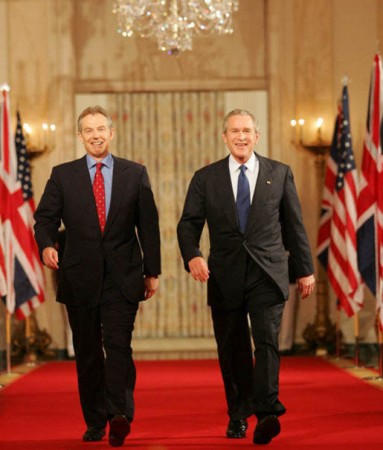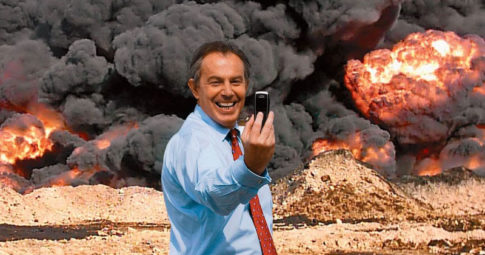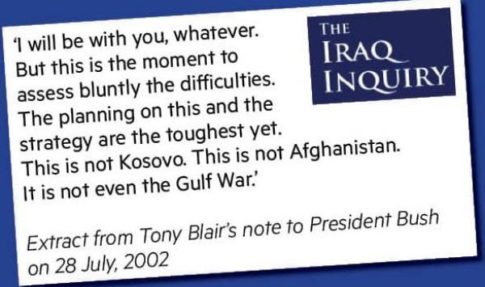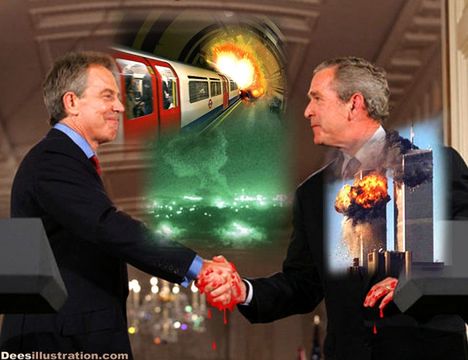– In Damning Report, Chilcot Inquiry Finds UK Rushed To War With Iraq Before It Was A “Last Resort”:
The Chilcot Inquiry, a British public inquiry into the nation’s role in the Iraq war, was published moments ago. The massive report covers almost a decade of UK government policy decisions between 2001 and 2009 and took seven years to complete. It covers the background to the decision to go to war, whether troops were properly prepared, how the conflict was conducted and what planning there was for its aftermath, a period in which there was intense sectarian violence.
One of the key focus areas of the report is the rationale that Tony Blair gave to the public in taking the UK to war, and whether or not the war was necessary. Upon its release, the report concluded that military action “was not a last resort”, and that Britain chose to join the invasion of Iraq in 2003 before peaceful options for disarmament had been exhausted.
The report’s main focus is on what commitments then-Prime Minister Tony Blair gave to then-US President George W Bush ahead of the invasion, and whether or not Blair misled the British public over the threat posed by weapons of mass destruction (WMD), which ultimately turned out to be non-existent. Critically, the report determined that the threat posed by WMDs in Iraq was presented with a certainty that was not justified, and the government failed to achieve its stated objectives of the war.
As summarized by BBC, the main points of the report are:
- The UK chose to join the invasion of Iraq before the peaceful options for disarmament had been exhausted. Military action at that time was not a last resort.
- The judgements about the severity of threat posed by Iraq’s weapons of mass destruction – known as WMD – were presented with a certainty that was not justified.
- Intelligence had “not established beyond doubt” that Saddam Hussein had continued to produce chemical and biological weapons.
- Policy on Iraq was made on the basis of flawed intelligence assessments. It was not challenged, and should have been.
- The circumstances in which it was decided that there was a legal basis for UK military action were “far from satisfactory”.
- There was “little time” to properly prepare three military brigades for deployment in Iraq. The risks were neither “properly identified nor fully exposed” to ministers, resulting in “equipment shortfalls”.
- Despite explicit warnings, the consequences of the invasion were underestimated. The planning and preparations for Iraq after Saddam Hussein were “wholly inadequate”.
- The Government failed to achieve the stated objectives it had set itself in Iraq. More than 200 British citizens died as a result of the conflict. Iraqi people suffered greatly. By July 2009, at least 150,000
- Iraqis had died, probably many more. More than 1m were displaced.
- The report sets out lessons to be learned: It found former prime minister Tony Blair overestimated his ability to influence US decisions on Iraq; and the UK’s relationship with the US does not require unconditional support.
- It said ministerial discussion which encourages frank and informed debate and challenge is important. As is ensuring civilian and military arms of government are properly equipped.
- In future, all aspects of any intervention need to be calculated, debated and challenged with rigour. Decisions need to be fully implemented.
More details from RT
The report’s main focus is on what commitments then-Prime Minister Tony Blair gave to then-US President George W Bush ahead of the invasion, and whether the former PM misled the British public over the threat posed by weapons of mass destruction (WMD), which turned out to be non-existent. Others in line for criticism include spy agency MI6 for providing inaccurate intelligence, and military commanders for failing to stand up to Blair. Speaking on the findings of the report, Sir John Chilcot says the severity of the threat posed by Iraq’s WMDs was “presented with a certainty that was not justified.” He says “despite explicit warnings, the consequences of the invasion were underestimated,” and the planning for Iraq after Saddam Hussein was “wholly inadequate.”
Chilcot says the government “failed to achieve its stated objectives.”
After the attacks in New York on September 11, 2001, Blair urged Bush not to take hasty action on Iraq, Chilcot says. But by early December, US policy had begun to shift and Blair suggested the US and the UK should work together on what he described as a “clever strategy” for regime change in Iraq, which would “build over time.” When Blair met Bush in Texas in April 2002, the formal policy was still to contain Saddam. But by then there had been a profound change in the UK’s thinking, Chilcot says.
“The Joint Intelligence Committee had concluded that Saddam Hussein could not be removed without an invasion. “The government was stating that Iraq was a threat that had to be dealt with. It had to disarm or be disarmed.” Britain’s formal decision to invade Iraq, if Saddam did not accept the US ultimatum to leave within 48 hours, was taken by the Cabinet on March 17, 2003. Parliament voted the following day to support the decision.
Thousands of anti-war supporters staged a demonstration in Westminster, demanding “truth and justice” and calling for Tony Blair and others to face the full charges.
“The Iraq War was a disaster, a disaster that began with a lie. If Tony Blair and other politicians responsible had told the truth it would never have happened. A country was destroyed, millions of innocent Iraqis were killed, British soldiers were killed, and terrorism has spread across the Middle East. Those responsible must now be brought to justice.” said Kate Hudson, an organizer of the protest.
* * *
The report found that Tony Blair committed to an invasion of Iraq almost eight months before receiving parliamentary and legal backing. In a previously unpublished memo from July 2002, Blair told George W Bush “I will be with you, whatever. But this is the moment to assess bluntly the difficulties. The planning on this and the strategy are the toughest yet. This is not Kosovo. This is not Afghanistan. I is not even the Gulf War.” That commitment, which was given without consulting colleagues, made it “very difficult for the UK subsequently to withdraw its support” for the March 2003 invasion.
Here is a summary of the key judgements and conclusions from the report via the Financial Times
How does Tony Blair emerge from this report?
The Chilcot report will disappoint those who were seeking a clear and decisive condemnation of the former prime minister. It presents Britain’s role in the Iraq debacle as a set of collective failures rather than the fault of an individual.
Nonetheless, the inquiry concludes that Mr Blair’s decision to go to war in 2003 was flawed. “The UK chose to join the invasion of Iraq before the peaceful options for disarmament had been exhausted,” it states. “Military action at that time was not a last resort.” The judgments about Iraq’s weapons of mass destruction were presented “with a certainty that was not justified” and the consequences of the invasion were underestimated.
Did Mr Blair privately tell George W Bush he was committed to war with Iraq before he had established the legal and parliamentary support he needed?
The US decided in late 2001 to pursue regime change in Iraq. On July 28 2002 — 10 months before the invasion — Mr Blair sent a note to the US president, stating: “I will be with you, whatever,” adding that getting rid of Saddam Hussein was “the right thing to do”. However, in that note, the prime minister set out three conditions where change was needed: progress on the Middle East peace process, UN authority for military action and a shift in public opinion in the west and the Arab world.
Those conditions may give Mr Blair some cover against the charge that he was pre-emptively committed to regime change. Even so, the Chilcot report states: “Mr Blair’s note, which had not been discussed or agreed with his colleagues, set the UK on a path leading to diplomatic activity in the UN and the possibility of participation in military action in a way that would make it very difficult for the UK to subsequently withdraw its support for the US.”
In September 2002, Mr Blair told Mr Bush that, if it came to war, Britain would have a significant military role. In January 2003 Mr Blair agreed to deploy three combat brigades for possible operations in southern Iraq. This happened before parliament and government legal advisers had given the green light for military action.
What judgment does Chilcot make of the UK government’s use of intelligence on Iraq’s WMD?
Chilcot states: “It is now clear that policy on Iraq was made on the basis of flawed intelligence and assessments. They were not challenged and they should have been.” On the September 2002 dossier published by the Blair government spelling out the alleged state of Iraq’s WMD stocks, Chilcot says: “Judgments were presented with a certainty that was not justified.”
The thrust of Chilcot’s criticism seems directed at the Joint Intelligence Committee headed by Sir John Scarlett; the JIC was responsible for collating all the intelligence and presenting it to ministers. For Chilcot, “the JIC should have made clear to Mr Blair that the assessed intelligence had not established ‘beyond doubt’ either that Iraq had continued to produce chemical and biological weapons or that efforts to develop nuclear weapons continued. The JIC should have made that clear to Mr Blair.”
However, there is also criticism about the way MI6, headed by Sir Richard Dearlove at the time, handled its remit. The Secret Intelligence Service, it says, had a responsibility to ensure that ministers “were informed in a timely way when doubts arose about key sources and when, subsequently, intelligence was withdrawn”.
Mr Blair is criticised for failing to tell the Commons the full intelligence assessment on the consequences of military action. In March 2003, he said that Saddam constituted a “real and present” danger to UK and national security. But Mr Blair had also been told that an invasion “would increase the threat from al-Qaeda to the UK and to UK interests”.
Was the war legal?
As expected, Chilcot does not express a view on whether the military action had the necessary legality. This, he says, can be done only by a properly constituted international criminal court.
However, Chilcot concludes that “the circumstances in which it was decided there was a legal basis for UK military action were far from satisfactory”. There is particular criticism of Peter Goldsmith, the attorney general, who changed his mind on the eve of war over whether the UK needed a second UN Security Council resolution explicitly permitting the invasion.
Lord Goldsmith “should have been asked to provide written advice explaining how, in the absence of a majority in the Security Council, Mr Blair could take that decision [to go to war]”.
Were the post-invasion problems encountered by the UK and US predictable?
Mr Blair told the inquiry the difficulties encountered in Iraq could not have been known in advance. Chilcot says: “We do not agree that hindsight is required. The risks of internal strife in Iraq, active Iranian pursuits of its interests, regional instability, and al-Qaeda activity in Iraq were each explicitly identified before the invasion.”
Moreover, UK ministers “were aware of the inadequacy of US plans” — but Mr Blair managed only to persuade Mr Bush to accept UN authorisation of the post-conflict role.
What went wrong with the occupation planning?
Mr Blair “did not ensure that there was a flexible, realistic and fully resourced plan that integrated UK military and civilian contributions.” In fact, the “scale of the UK effort in post-conflict Iraq never matched the scale of the challenge. Whitehall departments and their ministers failed to put collective weight behind the task”.
A particular problem arose when the UK began simultaneous operations in Afghanistan in 2006. The UK “did not have sufficient resources to do so”, Chilcot says. The increased emphasis on Afghanistan “had a material impact on the availability of essential equipment in Iraq, particularly helicopters and equipment for surveillance and intelligence collection”.
By 2007, British forces in Basra, southern Iraq, were unable to challenge “militia dominance” and so had to settle for handing over detainees in exchange for an end to targeting of their forces. The British military role ended “a very long way from success”.
In a statement responding to the report, Blair said the findings “should lay to rest allegations of bad faith, lies or deceit. Whether people agree or disagree with my decision to take military action against Saddam Hussein, I took it in good faith and in what I believed to be the best interests of the country,” adding that the report had made “serious criticisms and they require serious answers. I will take full responsibility for any mistakes without exception or excuse.”
* * *
PayPal: Donate in USD
PayPal: Donate in EUR
PayPal: Donate in GBP
* * *



